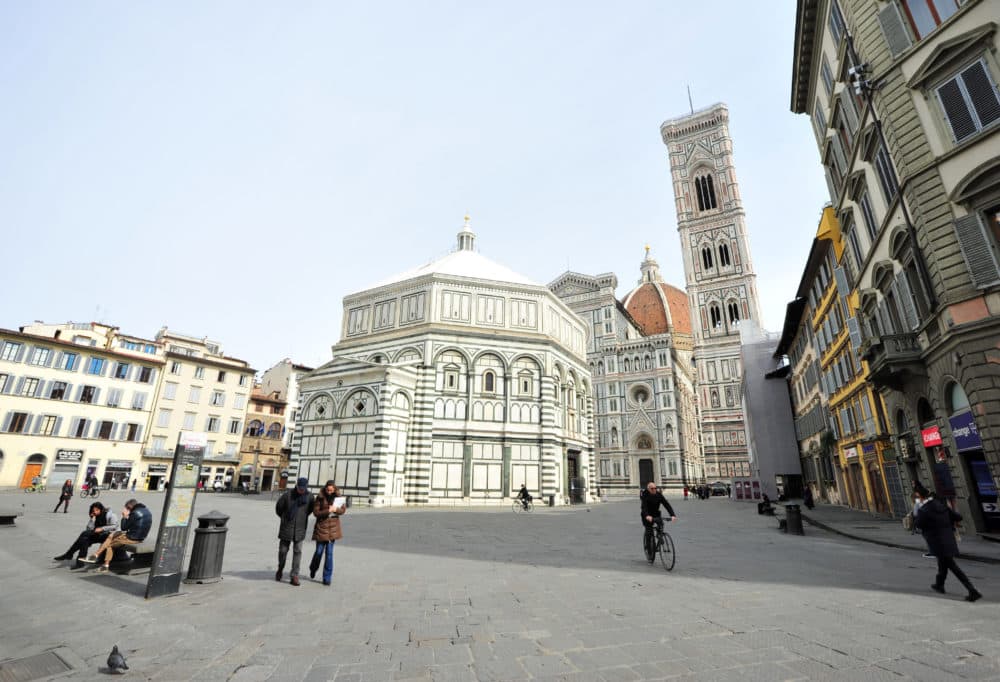Advertisement
An American Abroad: Choosing To Ride Out The Pandemic In Italy

As borders close and international travel grinds to a halt because of the coronavirus, many of us are worried about family members confronting the public health crisis in other parts of the country — or in other parts of the world.
In my case, I worry about my mother, Esther Brooks, who is 94 years old, and who chose to ride out the crisis in Italy, a hot spot of the global pandemic.
So now, a regular part of my day — along with careful hand cleaning and disinfecting — is checking in with her by phone.
"Everything today is going like it went yesterday and the day before, and probably will go tomorrow,” my mother told me on a recent call.
Some older folks go to Florida for the winter; my mother goes to Florence. Once it starts to get cold, she packs a suitcase of books and Nat Sherman cigarettes and heads to the birthplace of the Italian Renaissance, where she rents a small apartment by herself.
When the coronavirus epidemic hit Italy in February, she faced a choice: rush back to America, or ride it out in Florence. Even in the best of times my mother hates to fly, so the prospect of chaotic airports and crowded flights in the midst of a growing pandemic had her leaning toward staying. I was concerned that staying put in Florence would be risky. I am still concerned. We talked about it with family members, friends, and doctors, and the best advice she received was to do what makes her feel most comfortable. But she needed to understand that if she stayed, she might be locked down in Italy for weeks, and probably longer.
Well, she's still there. And she says she has no regrets.
“Italy is absolutely extraordinary,” she told me on a recent call, describing how the Florentines are coping with a government-mandated lock down which keeps them in their homes most of the day. “People are obeying the law. There’s no hysteria. You see very few people on the streets. But when you do, they are always pleasant.”
Advertisement
Under Italy's national quarantine, residents of Florence can only leave their homes to go to the doctor or pharmacy, perform an essential job, or shop for necessities.
“And this being Italy, those necessities are food, wine and tobacco,” my mother joked.
It's the tobacco that scares me the most. My mother is an unapologetic smoker, and she would be particularly vulnerable if she were to get sick. On the other hand, she's good in a crisis, and has a will of steel, which I am convinced is probably her best defense in a pandemic, wherever she decided to weather it.
For her part, she's glad she didn't rush home, not only because she's happy in Florence, but because she didn't want to risk bringing the virus home to family and friends in America.
“My main concern was for the welfare of the people I care about in America,” she said. “I didn’t want to bring anything home with me. I don’t feel I’m infected and, knock on wood, I won’t be because I’m very careful."
Despite the challenge of spending most of her time locked inside, she said Florence is a good place to be. Her days consist of reading, answering emails, talking to family members and very occasional walks to the local markets.
“I can’t describe this as a great joy, but it’s manageable,” she told me. “It’s going to end one of these days, and people here have been through much worse.”
My mother has seen hard times in Italy before. She first visited just after World War II, when there was serious post-war privation. Her experience in the country as it struggles to cope with coronavirus, she said, is a reminder that modern Italian civilization is built on the rubble and ruin of past calamities.
“I think part of the reason that the Italians are who they are is because they have been through so much,” she said. “They don’t expect as much from life as Americans expect. There is a wonderful sense of ‘get on with things and do the best.’ And now that there’s really something to complain about, nobody complains.”
And there is plenty to complain about for Italians, whose country is now at the epicenter of the global coronavirus crisis. Last week, Italy exceeded China’s death toll despite having fewer confirmed infections and a much smaller population. More than 5,500 Italians are testing positive every day; 1,400 died just last weekend.
But there is a flicker of hope that the worst will soon be over.
“We expect to see the first effect of the stringent lock-down measures adopted in March after two to three weeks, so the coming week will be absolutely crucial in this sense,” said Franco Locatelli, President of Italy’s Health Council. “We expect to finally see a sign of trend reversal.”
For the sake of the Italians — and my mother — I hope and pray that Mr. Locatelli is right. And as much as I have been worrying about my mother, I have also been admiring her courage.
“If this had to happen, I feel I’m lucky to be here,” she told me. “It’s a bad time. But we’re going to get through it.”
Meanwhile, The U.S. State Department has urged Americans not to travel overseas - and to return to the U.S. if they can. If they can’t, they should stay where they are. So, for the foreseeable future, my mother will remain in Italy.
This segment aired on March 23, 2020.
